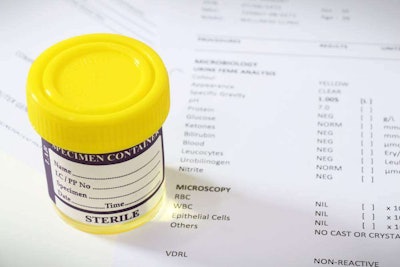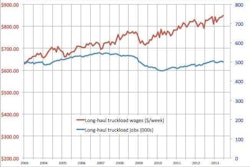Prompted by trucking interests, Sen. Mark Pryor, D-Ark., and Rep. Rick Crawford, R-Ark., introduced federal legislation this week designed to enable trucking companies to more effectively prevent lifestyle drug users from gaining employment as commercial truck drivers.
Companion bills in the Senate and House direct the Department of Health and Human Services to recognize hair testing as an optional method to comply with the Department of Transportation drug testing requirements for truck drivers.
Under current federal regulations, only urinalysis is recognized by HHS for mandatory pre-employment drug and alcohol exams of truck driver applicants. However, the number of truck driver applicants who pass a pre-employment urine test but fail a subsequent hair test is alarmingly high, according to the Washington, D.C.-based Alliance for Driver Safety & Security, also known as The Trucking Alliance.
For that reason, many trucking companies have turned to hair testing, which is more expensive, but is more effective in identifying drug users who apply for jobs as truck drivers.
“Passing this much needed legislation will give trucking companies the option of conducting either a urinalysis or a hair test or both methods and will also allow positive hair tests to be reported to the soon to be created national drug and alcohol clearinghouse that Congress adopted last year,” says Gary Salisbury, a member of the Trucking Alliance board of directors and the current chairman of the Arkansas Trucking Association.
Congress mandated the creation of a drug and alcohol clearinghouse last year and the Department of Transportation is expected to have the clearinghouse operational by next year. This database will identify any person who has previously tested positive on a pre-employment drug exam required by the federal government before being employed as a truck driver.
However, unless HHS recognizes hair testing as an approved methodology, no positive hair test results can be submitted to the national clearinghouse database. The new legislation introduced today will enable those drug test results to be reported to the clearinghouse.
“With millions of private-sector jobs and businesses relying on the trucking industry, I’m working every day to find new ideas to strengthen this economic powerhouse,” says Pryor, who also sponsored the clearinghouse legislation that became part of the current highway bill, MAP-21. “By allowing companies to eliminate duplicative processes, this bill will ensure our businesses have the certainty they need to invest, expand, and create jobs while securing the safety of our highways for all motorists.”
Pryor and Crawford were joined by were joined by Sen. John Boozman, R-Ark, and representatives Tom Cotton, R-Ark., Steve Womack, R-Ark., Tim Griffin, R-Ark. and Reid Ribble, R- Wis.
“We applaud this bipartisan effort of our Arkansas congressional delegation and Congressman Reid Ribble from Wisconsin for introducing legislation that will help keep drug users out of our freight trucks and off our nation’s highways,” says Lane Kidd, senior manager the alliance and president of the Arkansas Trucking Association.









